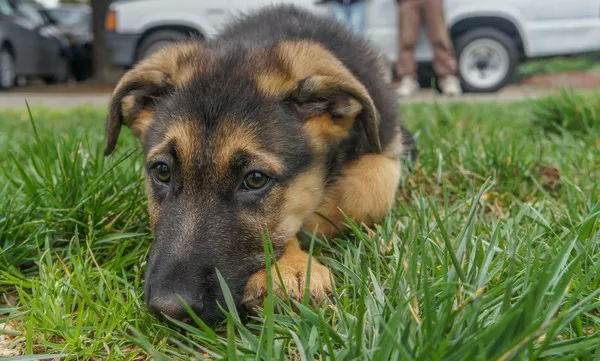Introduction:
Canine companionship is a delightful aspect of pet ownership, providing both humans and their furry friends with love, loyalty, and camaraderie. Among the diverse array of dog breeds, Huskies and German Shepherds stand out for their distinctive characteristics and unique personalities. But can these two breeds, each with its own traits and tendencies, form meaningful friendships with one another? In this article, we delve into the compatibility between Huskies and German Shepherds, exploring their behaviors, temperaments, and potential for fostering lasting bonds.
Understanding the Breeds:
Before delving into the dynamics of their friendship, it’s crucial to understand the individual characteristics of Huskies and German Shepherds.
Huskies:
Huskies are renowned for their striking appearance, with their thick double coats, distinctive markings, and piercing blue or multicolored eyes. Bred originally as sled dogs by the Chukchi people of Siberia, Huskies possess a high level of energy and endurance. They are intelligent, independent thinkers with a strong prey drive and a penchant for exploration. Additionally, Huskies are known for their sociable nature and affectionate demeanor towards humans.
German Shepherds:
German Shepherds are a versatile and highly intelligent breed known for their loyalty, courage, and versatility. Originally bred as herding dogs, they are characterized by their strong work ethic, trainability, and protective instincts. German Shepherds often form deep bonds with their human families and are renowned for their devotion and loyalty. With proper training and socialization, they can excel in various roles, including service, search and rescue, and law enforcement.
Assessing Compatibility:
Given their distinct characteristics, Huskies and German Shepherds may seem like an unlikely pair for friendship. However, compatibility between dogs is not solely determined by breed but also influenced by individual temperament, socialization, and upbringing.
Temperament:
Both Huskies and German Shepherds possess traits that can contribute to a harmonious friendship. While Huskies are known for their playful and sociable nature, German Shepherds exhibit loyalty and protectiveness towards their pack members. When introduced properly and given sufficient socialization, these breeds can complement each other’s personalities, with Huskies adding a playful element to the relationship and German Shepherds providing stability and protection.
Socialization:
Proper socialization plays a pivotal role in fostering positive relationships between Huskies and German Shepherds. Early exposure to various environments, people, and other dogs helps in shaping their behavior and reducing the likelihood of aggression or conflict. By gradually introducing them to one another in controlled settings and monitoring their interactions, owners can facilitate the development of a strong bond based on mutual respect and understanding.
Exercise and Stimulation:
Both Huskies and German Shepherds are highly energetic breeds that require plenty of physical exercise and mental stimulation to thrive. Engaging them in regular activities such as walks, hikes, and interactive play sessions not only helps in burning off excess energy but also strengthens their bond through shared experiences. Providing them with toys, puzzles, and enrichment activities can prevent boredom and destructive behavior, fostering a healthier and more harmonious relationship.
Training and Leadership:
Consistent training and clear leadership are essential components of managing a multi-dog household, especially when dealing with breeds as intelligent and independent as Huskies and German Shepherds. Establishing rules, boundaries, and expectations from an early age helps in preventing conflicts and promoting respectful behavior. Positive reinforcement techniques such as rewards and praise are effective in shaping desired behaviors and strengthening the bond between dogs and their owners.
See Also:What You Need to Know About German Shepherd Husky Mix?
Potential Challenges:
Despite their potential for friendship, Huskies and German Shepherds may encounter challenges due to their strong-willed nature and prey drive. Issues such as resource guarding, territorial behavior, and dominance struggles can arise if not addressed promptly and effectively. Additionally, differences in energy levels and play styles may lead to misunderstandings or conflicts between the two breeds. It’s crucial for owners to remain vigilant and proactive in managing any potential issues and seeking professional guidance if needed.
Case Studies:
To gain further insights into the dynamics of friendship between Huskies and German Shepherds, let’s explore some real-life examples of successful canine companionships:
Luna (Husky) and Max (German Shepherd):
Luna, a spirited Siberian Husky, and Max, a loyal German Shepherd, share a close bond that developed over years of shared adventures and companionship. Despite their initial differences in temperament and energy levels, Luna and Max learned to appreciate each other’s strengths and quirks, forming a strong and enduring friendship built on trust and mutual respect.
Kodiak (Husky) and Bella (German Shepherd):
Kodiak, an outgoing Husky, and Bella, a protective German Shepherd, found common ground in their love for outdoor activities and exploration. Through regular exercise, training, and socialization, Kodiak and Bella overcame their initial apprehensions and developed a deep bond rooted in companionship and camaraderie.
Conclusion:
In conclusion, while Huskies and German Shepherds may seem like an unlikely pair for friendship due to their distinct characteristics, with proper introduction, socialization, and training, these two breeds can indeed forge lasting and meaningful relationships. By understanding their individual traits, addressing potential challenges, and nurturing their bond through shared experiences, owners can help facilitate a harmonious companionship between Huskies and German Shepherds, enriching the lives of both dogs and humans alike.
Related Topics:






















